Yang Jiang once said that when she was young, she thought that it was not enough to understand life without reading. Until later, she found that if she did not understand life, she could not understand books. The meaning of reading is probably to use the sense of life to read and the gains from reading to live. It is important to read good books, which may never make you bored. It can not only expand knowledge, but also precipitate the soul. Reading a good book is like communicating with a wise man. It can solve the doubts in your heart and light the light in your heart and the way ahead. If you read a good book carefully, hard times will become the beauty and treasure of life.
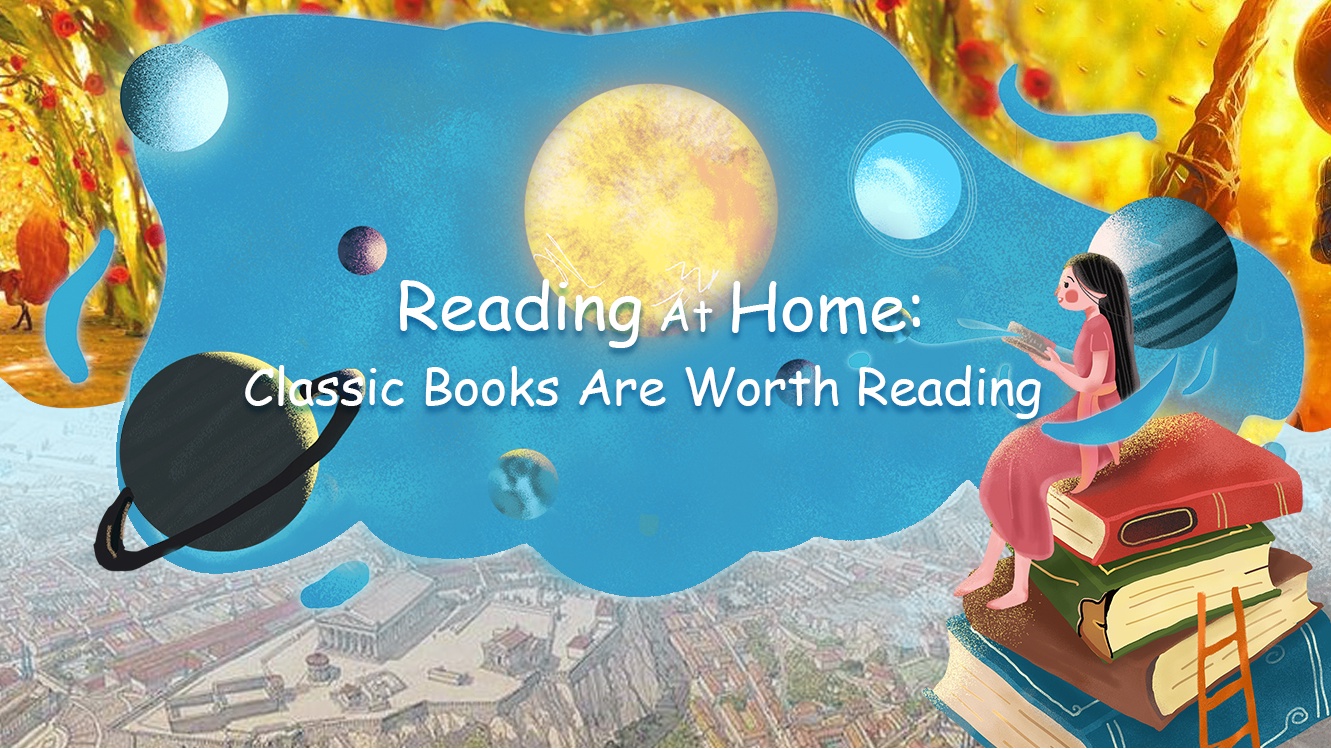
Interpretations of the Analects of Confucius
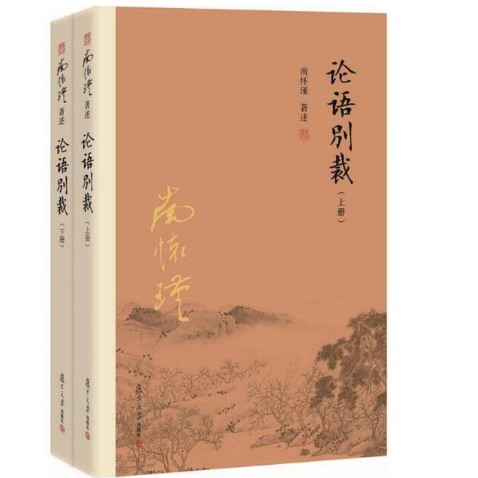
Introduction
In order to understand the traditional culture, we must first understand the academic thought of Confucianism. If we want to talk about Confucianism, we must first study Confucius and Mencius. If we want to talk about Confucius' thoughts, we must first understandthe Analects of Confucius.The Analects of Confucius is an important Confucian classic which records the speech and behavior of Confucius. Mr. Nan Huaijin once explainedthe Analects of Confucius three times between 1962 and 1975. At the time of publication of the third collection of lecture notes, Mr. Nan names it "biecai", which means that his interpretation is just his own opinions and different from the Confucian classics. Mr. Nan believes that there are many mistakes in the previousexplanations ofthe Analects. The main problem lies in the incorrect meaning and the unscientific content. He interpret the Analects of Confucius in a way "different from the orthodox Confucian classics" and focuses on "experience inside and beyond".Mr. Nan Huaijin don’ t explain the Analects on the superficial level. He had his own unique understanding of the main idea of the original text and his interpretations are very refreshing to read. It is also interspersed with historical and realistic stories, which are profound, interesting and memorable. The language of the article is natural and simple. It's like an old man sitting by and telling you about the events in history~
Author
Mr. Nan Huaijin, born in the family of scholars, began to read poetry and books when he was a child. He read almost all the classics. He studied and understood Chinese culture deeply. He was accomplished in Confucianism, Taoism and Buddhism of traditional Chinese culture. He also mastered thoughts of “hundreds of scholars”, poetry, astronomical calendar, and medical health care. He also had a deep understanding of western culture. He has been respected by people in the Chinese and Western cultural circles and can be called “a great master”.
The Way of Living
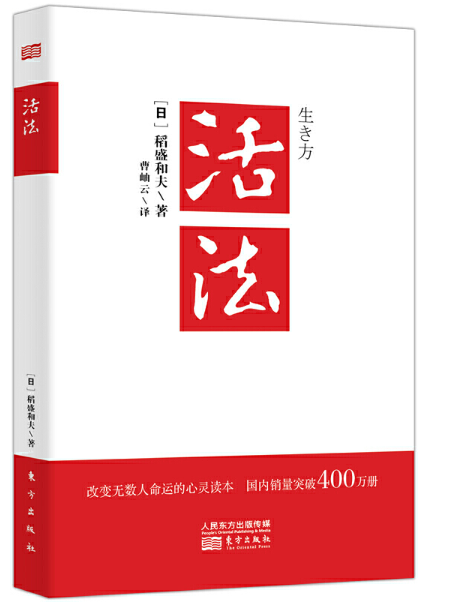
Introduction
At this moment, we are in an “uneasy era”, extremely chaotic, unable to see the future. A mind that is supposed to be rich can never be satisfied. Food and clothing are safe, but there is less etiquette. We seem to have freedom but often feel suffocated. If we don't try to think about the way of living thoroughly, current chaos will only deepen, and we will not see them clearly in the future, and social chaos will only continue to expand and spread. In fact, as long as we are willing to work hard, what can’t we get? What can defeat us? It's just that we are pessimistic and powerless. Some people are even willing to take risks and violate the law. Why is our society shrouded in such a depressing atmosphere? That's because many people don't know the meaning and value of existence and they lose the compass of life. This book is just for everyone to find the direction of life.
Author
Inamori Kazuo was born in 1932 in Kagoshima, Japan, and graduated from the Engineering Department of Kagoshima University in 1955. He founded Kyoto Ceramics Co., Ltd. (now Kyocera) in 1959, and the Second Electronics Co., Ltd. (now KDDI, now the second largest communication company in Japan after NTT) in 1984. Both companies have entered the top 500 of the world. He is the youngest and the only living one among the four "business saints" in Japan. On February 1, 2010, 78-year-old Inamori Kazuo officially became the chairman of the board of Japan Airlines, which had been under bankruptcy and reconstruction, under the attention of the whole world. After using Inamori's business philosophy, a miracle soon appeared. By November 2010, JAL's profit had reached 140 billion yen, which amazed the whole world.
Ji Xianlin, a master of Chinese studies, once said that, according to his observation in the past 70 to 80 years, there were few people who were both entrepreneurs and philosophers. Inamori Kazuo was the first of this kind.
Educated: A Memoire
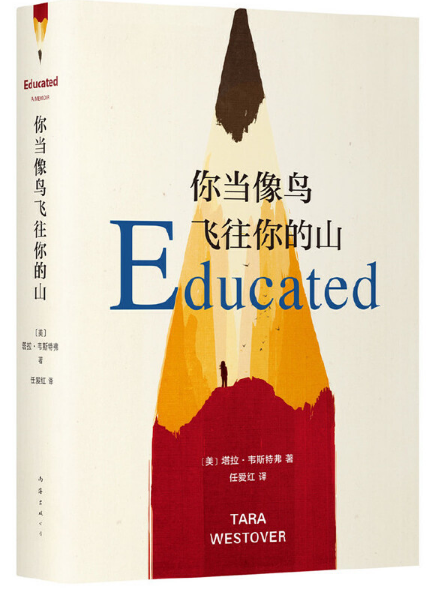
Introduction
People only see my difference: a girl from a mountainous area who never stepped into the classroom before the age of 17, got a degree, shining.
Only I know what I am. I come from a family that few people can imagine. My childhood was made of scrap iron from the dump, where there was no reading sound, only the roar of cranes. Not going to school, not going to hospital, is the loyalty and truth that our father has wanted us to adhere to. Father doesn't allow us to have our own voice, and our will is the devil in his eyes.
Harvard University, Cambridge University, master of philosophy, doctor of history… I know that an ignorant girl like me, who crawls out of the garbage, should be grateful for her achievements. But I can't be excited about it at all.
I used to be timid, broken, and self-doubting. Something in my heart has rotted and stank. Until I fled away from the mountains has another world been opened up. That's a new world that education has given me. That's the infinite possibility of my life.
Author
Tara Westover is an American writer and historian. Born in the mountains of Idaho in 1986. Before the age of 17, she never went to school. She got her bachelor's degree in 2008 from Brigham Young University through self-study. She was awarded the Gates Cambridge Scholarship and received her master's degree in philosophy from Cambridge University in 2009. In 2010, she won a scholarship from Harvard University and became a visiting scholar. In 2014, she obtained a doctorate in history from Cambridge University. Her first work,Educated: A Memoire, is her memoir based on her growth and learning experience. In 2019, she was named "influential person of the year" by the Time.
Sapiens: A Brief History of Humankind
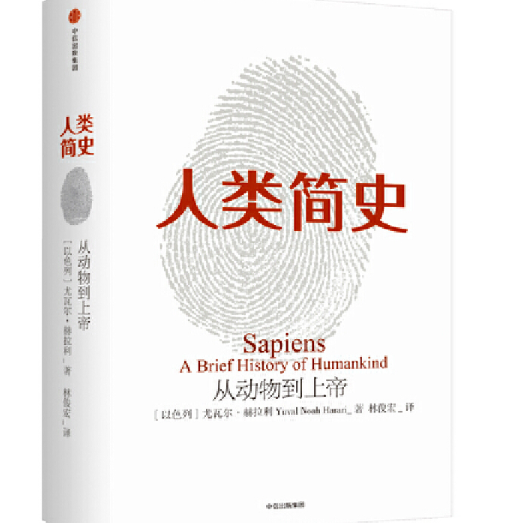
Introduction
100 thousand years ago, there were at least six different kinds of people on earth, but today, why are we the only one left on the world stage? How do we rise to the world stage to become the spirit of all things, from the ape man who could only nibble at the remains of wolves and tigers to the wise man who leaped to the top of the food chain, from the primitive man's fingerprint on the cave wall of Chevy to Armstrong's footprint on the moon, from the cognitive revolution and the agricultural revolution to the scientific revolution and the biological technology revolution? From the Code of Hammurabi in the 18th century BC tothe Declaration of Independence in America in the 18th century, from imperialism and capitalism to liberalism and consumerism, from animal desire to material desire, from animal nature and human nature to divinity, do we know ourselves? Are we happier? What on earth do we want to get and become?Sapiens: A Brief History of Humankind
is a representative work of the new Israeli historian Yuval Noah Harari. It describes the history of human development from the beginning of signs of life 100 thousand years ago to the 21st century which is interwoven with capital and technology. It weaves science and history together, and expounds the development history of intelligent human on the earth from a new perspective.
The book clarifies the context of human development from three clues. The cognitive revolution, agricultural revolution and technological revolution have completely changed human history. The cognitive revolution makes human beings a community of imagination; the agricultural revolution makes human beings fall into the trap of luxury life; the scientific and technological revolution will eventually make human beings a god like existence. Human beings connect and cooperate with each other effectively through imagination and the fictional ability. Countries, religions and enterprises are imaginary and fictional reality. Human beings rely on this imagination to seek identity and carry out cooperation, so as to step up to the top of the food chain and reach a position beyond the reach of other creatures.
This is a grand brief history of human beings. We should clarify the major context that affects human development, tap the root causes of human culture, religion, law, country, credit and so on. We should be more insightful and use small figures to make human beings reexamine ourselves and the world around us in the big history.
The Story of Egypt
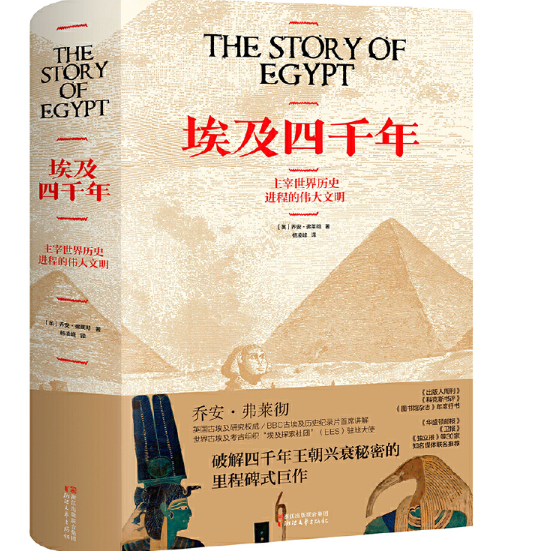
Introduction
Egypt, the greatest civilization in the world, has an ancient story spanning more than 4000 years, which in turn shapes the whole world in the future. Professor Joan Fletcher, the research authority of ancient Egypt in the UK and the chief interpreter of BBC Ancient Egypt History Documentary, links the past of ancient Egypt into a book to fully record the rise and fall of the dynasty, and present the whole world of ancient Egyptians in a historical situation that everyone can understand.
This book is the representative work of Joan Fletcher. It is the original work of a series of programs related to the interpretation of ancient Egypt by BBC TV, so it has the objectivity and authority of BBC Documentary. The book takes the dynasties of more than 4000 years in ancient Egypt as the stage, and describes the situation of different dynasties in a chronological order. According to archaeological objects, such as murals, temples, pyramids, and various unearthed documents, it restores the life of each dynasty and the development of the dynasty, and records the secular life of the people at that time. The book is divided into 20 chapters according to the dynasties in history, representing the thousands of years' history of Egypt B.C. It is the first authoritative work in China to fully explain the history of ancient Egypt.
Author
Joanne Fletcher is a professor in the Department of Archaeology at the University of York, UK. Her main field is mummy research and funeral archaeology in the world. She is a consultant expert in ancient Egyptology at the museum and art institute of Harrogate, an archaeologist at the museums of Barnsley and Wigan, England. She has written nine related works and a large number of research papers. She has provided a manuscript for the historical website of the BBC. She has also written commentaries for BBC2 on "Life and Death in The Valley of Kings" and "The Lost Queen of Egypt", and hosted them as a guest.
Find Hermits in China
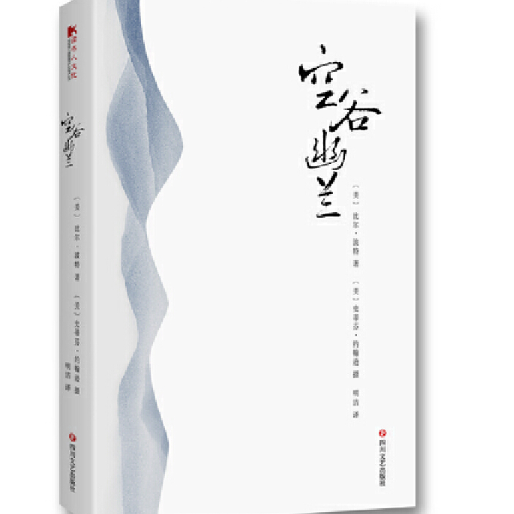
Introduction
In the late 1980s, Bill Porter, a famous American Sinologist, translator and writer, came to China in person to find the tradition and historical trace of hermit culture, and to visit the hermits living in different places, so as to express his high praise and infinite yearning for Chinese traditional culture, thus starting a unique "cultural Renaissance" journey.
“Secluded orchid in a deserted valley” is often used as a metaphor for people of high morals. In Chinese history, hermits, a unique group, included many such noble people. Now, do these people still exist in China's vast land? This is a problem that has been bothering the author.
In the history of China, there have been people willing to spend their lives in the mountains. They ate very little; they wore very shabby clothes; they slept in thatched houses; they reclaimed wasteland in the mountains; they didn’t speak much; they left less words –maybe only a few poems, one or two prescriptions to become immortal or something. They are divorced from the times, but not from the seasons; they abandon the normal life on the plains and choose the beautiful scenery in the mountains; they have a long history but are unknown. They have nurtured the root of spiritual life and have been respected people in the ancient society of the world.
Author
Bill Porter is a contemporary American writer, translator and sinologist. In 1970, he entered Columbia University to study for a Ph.D. in anthropology. By chance, he began to learn Chinese and fell in love with Chinese culture. In 1972, Bill went to a temple in Taiwan to practice Buddhism, where he lived in seclusion. In 1991, he went to work in a radio station in Hong Kong, and began to travel in mainland China for a long time. He has written a large number of books and travel notes about Chinese customs and translated many Buddhist classics and poetry collections, setting off a wave of learning Chinese traditional culture in European and American countries.
After this book was published, it has been warmly welcomed by readers. In recent years, he has successively published The Bag of Zen which traces back to Chinese Zen culture and history,The Journey to The Yellow River which traces back to the source of the Yellow River,The Silk Road which traces back to brilliant chapters in the history of Chinese culture,South of the Clouds which explores the customs of ethnic minorities in Southwest China,Find Ancient Poets which seeks the traces of Chinese ancient poets, andThe South of the Yangtze River which depicts the charm of South China. These travel notes about Chinese cultural journey are also loved by readers, and highly recommended by Annie Baby, An Yiru, Chen Kun, etc.
L’Antiquité Retrouvée
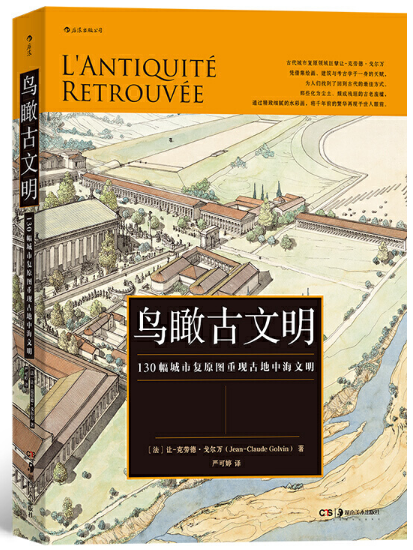
Introduction
When we read history books and close our eyes to imagine the ancient people's life, the biggest difficulty and the smallest mistake are not the ancient people's activities themselves, but their places of activity. I cannot imagine activities without knowing the places where they took place. The lack of background makes everything fall into disorder. The beautiful and harmonious picture turns into funny or ugly fragments without coherence. The importance of the restoration map of ancient cities is that it helps us go back to the scene and experience history with our imagination and in person.
There is no doubt that the drawing of the ancient city restoration map is a challenging job, but the author of this book,Jean-Claude Golvin, and his team, with rich knowledge of archaeology and architecture and his excellent painting talent, have achieved this goal. He uses delicate watercolor paintings to directly present the ancient Mediterranean civilization, from 2500 B.C. to the 5th century A.D., spanning 3000 years. With 130 restoration maps and words, 87 regions and cities are introduced carefully, including Mesopotamia, ancient Egypt, ancient Greece and ancient Rome. Among them, there are not only important towns repeatedly mentioned by various historical books, but also many places once brilliant but forgotten. Each picture is the crystallization of thousands of pieces of information, and even a synopsis of the history of a city for hundreds of years, which is worth savoring.
Through the restoration map in front of us, we can enjoy the crystallization of many civilizations and get another perspective to observe history, which is an interesting intellectual experience.
Author
Jean-Claude Golvin is a French architect and archaeologist. He was a researcher at CNRS. He has been committed to the restoration of ancient ruins for a long time, and is a giant in the field of ancient city restoration map production.
After acquiring the qualification of architect in 1969,Jean-Claude Golvin participated in a number of archaeological projects. Since 1973, he has been involved in the renovation of Tunisian Circular Arena in Thysdrus. In the process, he found his love for history and began to study for a doctorate in history in 1985. From 1979 to 1990, he took Egypt as his stronghold and directed the work of "France-Egypt-Karnak Temple research center" in Luxor, Egypt. Since 1989, he has been engaged in the restoration of ancient cultural heritage by watercolor. At present, more than 1000 restoration maps of various cities and monumental buildings from ancient times to middle ages have been drawn, most of which are preserved by the Arles Archaeological Museum. The museum is dedicated to displaying ancient history and culture, which is second only to the Louvre in France.
The Importance of Living
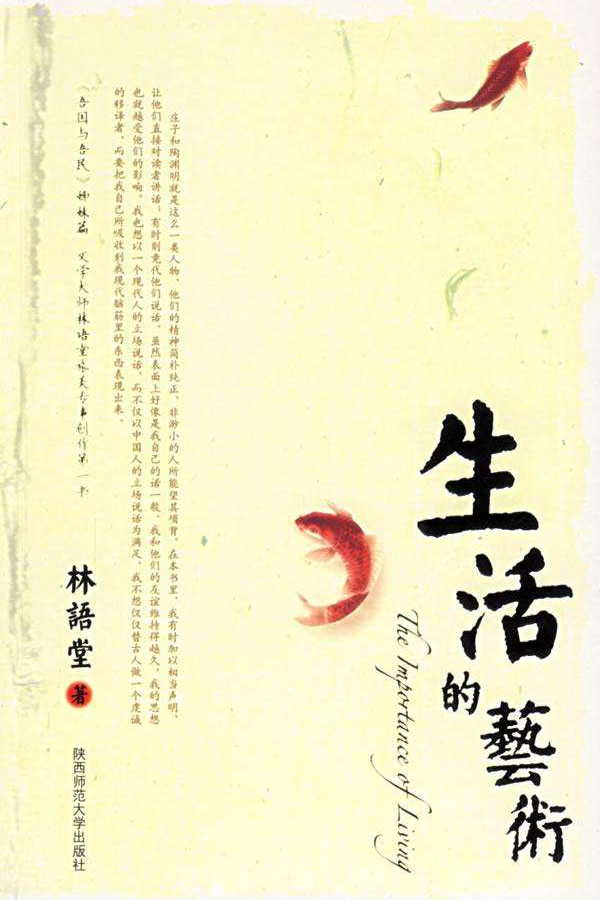
Introduction
This book is a collection of essays. Lin Yutang talks about Chuang Tzu's indifference, praises Tao Yuanming's leisure, recites Come Away Home, and explains the story of the Bible. He talks about how Chinese people sip and taste tea, how to play a drinker’s forfeit game, how to enjoy mountains and waters, how to see clouds, how to judge stones, how to raise flowers and birds, how to appreciate snow, listen to rain, chant wind and play with the moon, and so on. Lin Yutang writes about the Chinese people's broad-minded and philosophical life style and the romantic and elegant oriental sentiment, narrates a perfect model of life style and a typical happy life that can be imitated, and shows a different style of poetic life, talent life, humorous life and intelligent life.
Author
Lin Yutang, a master of Sinology, is a Chinese writer nominated for the Nobel Prize for Literature twice. He has writtenThe Importance of Living,My Country and My People, andMoment in Peking, and introduced the philosophy of Confucius, Mencius, Laozi and Chuang Tzu, and literary works of Tao Yuanming, Li Bai, Su Dongpo, Cao Xueqin, etc. overseas. He is a well-known Chinese writer who is famous for writing in English, and a well-known scholar in the field of linguistics, philosophy, and literature.



